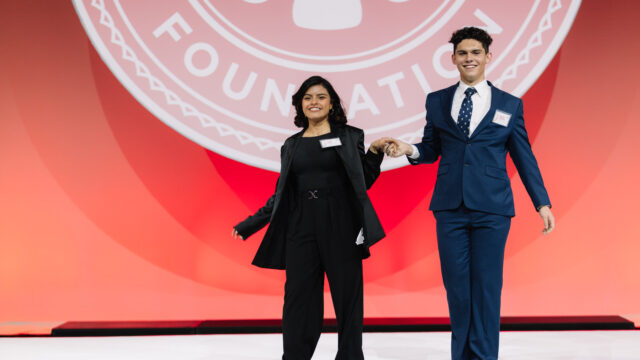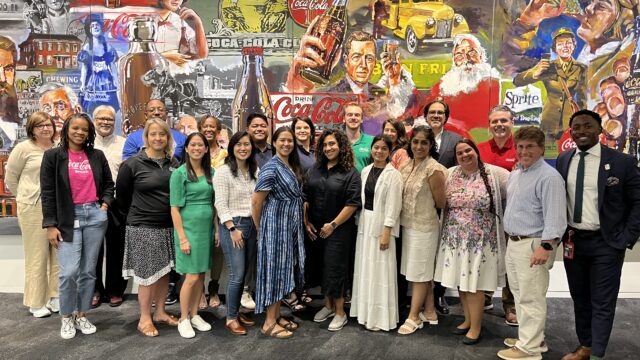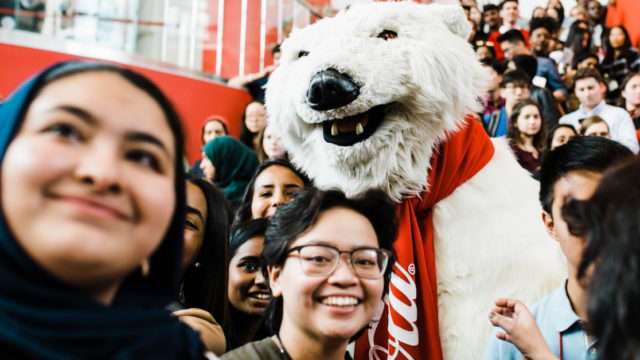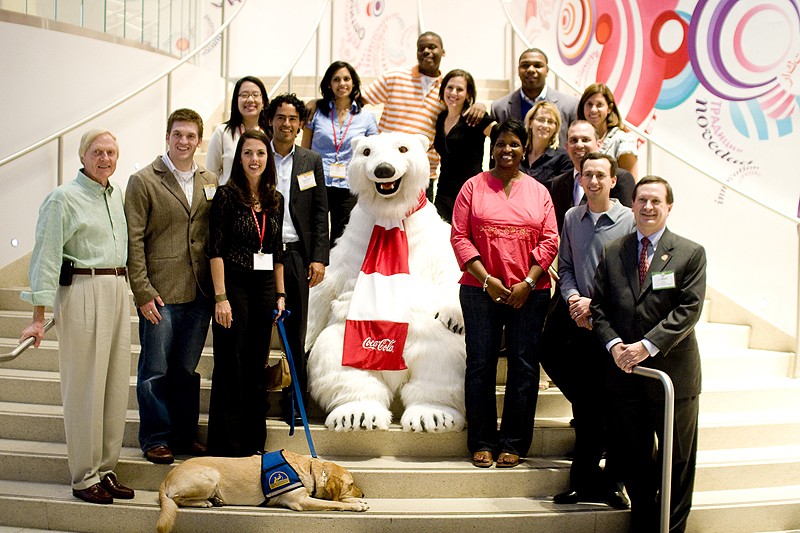
Celebrating 25 Years with CCSF: Looking Back with Mark Davis
December 21, 2012, is Mark Davis’s 25th anniversary with the Coca-Cola Scholars Foundation.
He’s the one person who’s met EVERY scholar—and there are more than 5,000. He reads every finalist application. And he can tell you the secret to the program’s success.
What are Mark’s most memorable moments? How have Scholars inspired him? How did he end up with the CCSF in the first place?
In the first installment of a two-part series, 1989 Scholar Carrie Regan spoke with our fearless president to find out the answers to these questions and more.
Carrie: How did you end up leaving the glamorous world of accounting and joining the Coca-Cola Scholars Foundation?
Mark: In retrospect, it was the best phone call I ever got in my life. Out of the blue a search firm called and asked me if I was interested in interviewing for a job—as financial officer—with a new organization. So I met with Mebane Pritchett, my predecessor, and really got excited about what they were planning.
It was pretty easy for me to make that transition because it was keeping with my philosophy of supporting others and their dreams and aspirations—something that was instilled in me by my parents at an early age.
Carrie: When you first heard about the scholarship program, were you surprised to hear that a company like Coke was making such a sizeable, long-term investment in education?
Mark: I wasn’t surprised, but I was naïve. I thought scholarships were a common part of what companies did in their corporate giving programs. But after I came here, I realized that this was an extraordinary gift on the part of Coca-Cola. I think a lot of the growth in the last decade in terms of corporate scholarships has been modeled after our program, and that’s a real compliment to what Coke put in place 25 years ago.
Carrie: What are some of the lesser-known facts about the Foundation’s origins that might surprise us?
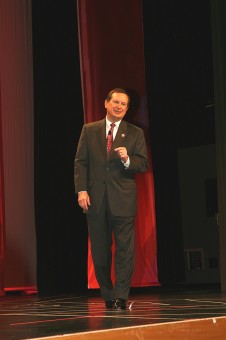 Mark: The first thing is that our founding board members were pretty visionary. It would have been very easy for them to say, “This is a scholarship for students studying finance or marketing or some other business focus.” It could have been a recruiting tool to come into Coca-Cola. But they had a vision that we were going to support leadership, and that was going to come in every line of study and every career path. I think that was a pretty interesting attitude to have.
Mark: The first thing is that our founding board members were pretty visionary. It would have been very easy for them to say, “This is a scholarship for students studying finance or marketing or some other business focus.” It could have been a recruiting tool to come into Coca-Cola. But they had a vision that we were going to support leadership, and that was going to come in every line of study and every career path. I think that was a pretty interesting attitude to have.
Secondly, I didn’t realize at the time what a significant commitment the Coca-Cola bottlers and the company made, pledging to commit a penny per gallon of Coca-Cola syrup over a five-year period. It created a $25 million fund for us at the Foundation. That was really unusual when we were just getting started.
Another thing that stands out in my mind is that we were really surprised by the number of students who applied to be Scholars that first year. Everyone we talked to said we might get 12,000 applications. That seemed like a huge number. Our initial applicant pool was over 48,000—four times the amount of applicants we thought we would get.
Carrie: You’ve been here 25 years. Was there a particular moment when you thought, “This is a pretty good gig”? Or did we just grow on you?
Mark: (Laughs) You guys have definitely grown on me over time. Really, I think I knew pretty early that this was going to be something special. We didn’t know what to expect that first Scholars Weekend in 1989. We had a sense that it might be kind of tense for the Scholars. They’re coming to Atlanta to interview. It will be very competitive. Will they be trying to stab each other in the back? Sabotage each other?
But that never happened, and it never has happened. Every class that comes through is very supportive of each other. I think part of that is that everyone knows they are winners. No matter how much they receive, they are Coca-Cola Scholars. Seeing how supportive they’ve been of each other has always been very inspiring. In a lot of ways it meant that the selection process we have for identifying young people who will be leaders works.
Carrie: The Coca-Cola Scholars Foundation has changed so much over the years. How has it grown? Who are some of the people who’ve been pivotal to its success?
Mark: There are so many people. We’ve really been blessed over the years to have great board members. They’ve been great supporters, committed to it and nurtured it. It’s really been a “who’s who” of the Coca-Cola system.
You start with Crawford Johnson, who was our founding chairman. Some of the other bottlers who’ve been engaged include Summerfield Johnston, Sandy Williams, Jack Pelo, Claude Nielsen, Wes Elmer, Bob Browne. We’ve had great support from Ingrid Saunders Jones, Ike Herbert, Carl Ware, and now Sandy Douglas. And of course Muhtar Kent has been an exceptional spokesperson for us. He’s been very supportive while he’s been Chairman. We’ve had such great leadership on our board.
Of course, I have a great team here in Atlanta. They’ve been here a long time, and they understand what it is that we’re trying to do and they’re excited about it every day they come to work. I’ve had a chance to work with some really special people, and they’ve all had a big part to play in the success we’ve had over the years.
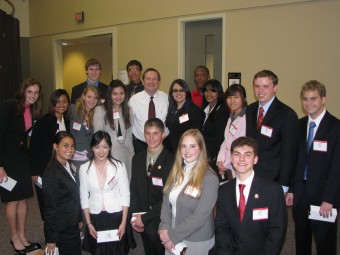 Carrie: What’s your secret for alumni involvement? Why do you think this program has been able to keep people involved, even those like myself who got the scholarship more than 20 years ago?
Carrie: What’s your secret for alumni involvement? Why do you think this program has been able to keep people involved, even those like myself who got the scholarship more than 20 years ago?
Mark: We knew before we awarded the very first scholarship and even wrote the first check that we wanted to be involved with the Coke Scholars while they were in college, after they graduated, and hopefully as long as they invited us to be a part of their lives.
There’s a level of alumni engagement here that’s actually quite uncommon. There are so many scholarship programs that have come to us and said, “How do you do this? How does Coca-Cola stay engaged with their alumni?” or, “We want to engage with our alumni but we don’t know where they are.”
That’s a lost opportunity to measure the impact you’re having. I just can’t imagine being a scholarship organization and not being able to tell donors how you spent their money and what happened in the decades that followed. It’s so much easier to say, “We gave this money to Carrie and this is what she’s doing now.”
Carrie: I remember typing my application on a typewriter 24 years ago and then writing actual letters to my roommate from Scholars Weekend. How has technology impacted the program?
Mark: No question—in those initial years all our communications with Scholars were either by telephone or letter. Then we got fax machines, and that was such a technological leap forward at the time. Later on the Internet arrived and we had email. We’ve been very fortunate that all these technologies and new ways to communicate have come along at just the right time.
You really can’t pick up the phone and call 5,000 Coca-Cola Scholars to check on them, no matter how large your staff is. Our relatively small staff uses text messaging, Facebook, Twitter, and LinkedIn to stay connected to our Scholars. It would not be same program without the technological improvements we’ve seen.
Carrie: You’ve heard so many inspiring stories about Scholars over the years. What are some of the stories stick in your mind?
Mark: Every Scholar is unique and special. And I’m always amazed at how Coke Scholars identify with their community, understand what the issues are, and know how to address them.
In addition, our program is so richly diverse. We have fantastic musicians, young scientists, volunteers who are having an amazing impact on a local and global level—all while they are 17 or 18 years old. There are a lot of Scholars who’ve overcome some incredible obstacles: poverty, abuse, dysfunctional homes, homelessness … just horrific circumstances. But they’ve used that trauma as an inspiration for themselves and have become an inspiration by focusing on how they can help others faced with similar circumstances.
What I have experienced almost every year is students seeking me out, privately coming up to me and saying they don’t belong at Scholars Weekend. I remember distinctly the first time that happened to me. A Scholar, just call him Jon, came up to me and said, “I don’t belong here. All these other kids are going to Harvard, they’re so accomplished and doing such fabulous things. There must have been a mistake.”
The first time that happened to me I thought, “Well, I better go back and check the selection process.” I did—I went back and read all the materials he had submitted, and he was unquestionably a great Coca-Cola Scholar, a perfect match for what we were looking for. But he didn’t see himself that way.
So over the years we followed him. He went to a regional university in his home state, then medical school, and now he’s a doctor and has a family practice in his community and is a great example of what it means to be a Coca-Cola Scholar.
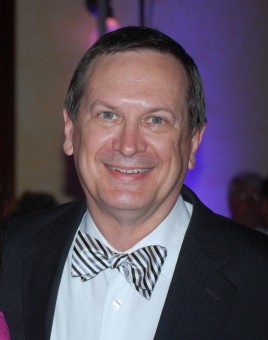 Carrie: What have been some of the highlights of Coke Scholars weekend for you?
Carrie: What have been some of the highlights of Coke Scholars weekend for you?
Mark: I’ve read all the materials on each of the Scholars and I’m always excited to meet them and have a chance to learn from them. When they come to Atlanta, a lot of them don’t understand what it means to be a Coke Scholar. They come here expecting to have a lot of time to do homework. But then they suddenly realize that this is an opportunity to interact with extraordinarily talented people.
In a lot of ways it starts that first night at the Scholars Banquet. Over the years we’ve had some wonderful speakers—First Lady Barbara Bush, President Carter, Dr. Ben Carson. Of course my favorite of all time was Archbishop Tutu. I think the Scholars suddenly realize, “This is something different.”
I know at the end of every weekend that we’ve been successful in connecting them when they’re all getting ready to go to airport and they’re all totally exhausted because they’ve stayed up all night to get to know each other better. They recognize, “I may not have another opportunity to interact with this group of people again.” I think that’s a special part of Scholars weekend.
Carrie: The program has now been around long enough that with such a sizable alumni community, there’s this growing legacy of Scholars helping other Scholars. Can you talk about some of the recent examples that have impressed you the most?
Mark: There are so many. Scholars support each other on a regular basis. And now with social media and the communications environment that exists, Scholars can support each other in huge numbers, online. But the one-on-one connections that we see are the ones that really resonate.
One recent example: We were hosting an alumni reception in Houston in October. Over dinner, one Scholar, Michelle, who’s an oncologist, mentioned that she needed someone to help her with the language barrier because of the Hispanic population she was serving at a women’s clinic. And sitting right across the table was Lucy, a first year medical student at Baylor who was looking for an internship. So bingo! It’s amazing how those things happen. And now Lucy and Michelle are working together and it’s good for both of them.
Another recent example is what Kevin Chung did on his 40th birthday. He used this milestone birthday as a way to raise the money that he’d gotten as a Coke Scholar in 1990—$20,000. He threw a great party, had a full panel of Scholars there to talk about their experiences, and ended up raising $32,000. Things like that are amazing to me, how Scholars are helping each other. At almost every reception that we host, invariably, somebody is walking away as one Coke Scholar connected to another Coke Scholar in a meaningful fashion.
Carrie: How have Coke Scholars inspired you?
Mark: There’s something special about every Coke Scholar. They never cease to amaze me. They’re smart, committed, and passionate, and just seeing how they support each other is always inspiring. Now, with this upcoming 25th class, there’s a full generation of Coke Scholars, and I’m now particularly pleased to see the nurturing going on with some of the earlier Coke Scholars and newer classes.
A great example is Tim McCallum (1991) and what he’s doing with Kim Heng (2010). He’s essentially a father figure for Kim. They have a really special bond that spans their generational gap and that never would have happened if they weren’t both Coke Scholars. The way Tim took Kim under his wing and made sure that he got to go back home (to Cambodia) to see his dad … I don’t know that there are many people in life that you would run across who would do something like that. That’s a special connection.
Stay tuned next week to learn more about how Coca-Cola Scholars inspire Mark and where he sees the Foundation headed in the future.
Carrie Regan, a 1989 Coca Cola Scholar and co-chair of the CCSF Alumni Advisory Board, is a graduate of Boston University’s College of Communication and served as a US Peace Corps Volunteer (Guinea, ’94-97). She currently runs Carrie Regan Media, working primarily in documentary/nonfiction television for clients that include Discovery Studios and National Geographic Television. In her spare time she’s also a Spinning instructor, Certified Personal Trainer and Certified Triathlon Coach who offers advice for the everyday athlete at www.carrieregancoaching.com.


